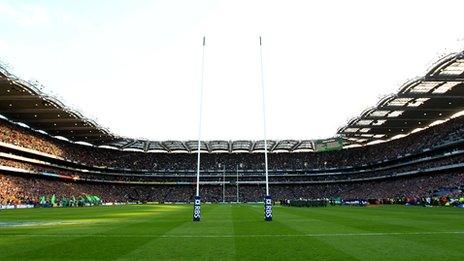Casement Park redevelopment: Stadium planning approval unlawful
- Published
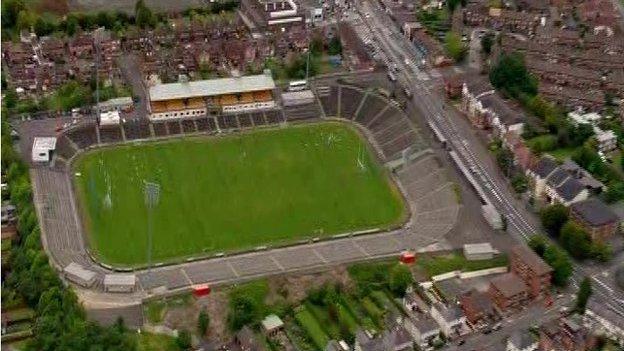
The environment minister had granted planning permission for a new 38,000-seater stadium at Casement Park
Northern Ireland's environment minister acted unlawfully in approving a new GAA stadium in west Belfast, a High Court judge has ruled.
Planning permission for the 38,000-seater stadium was granted by Mark H Durkan in December 2013.
Local residents who objected to the size of the planned development launched a legal challenge in response.
Mr Justice Horner held that the decision-making process was "fundamentally flawed".
Bigger crowds
He identified failures in the environmental impact assessment of the increased facilities and an unrealistic reliance by the Department of the Environment (DoE) on an existing 32,600 capacity as a baseline for the project.
With far fewer spectators normally attending matches at the current ground, the judge also found that the effect of bigger crowds on the surrounding roads network had not been properly examined.
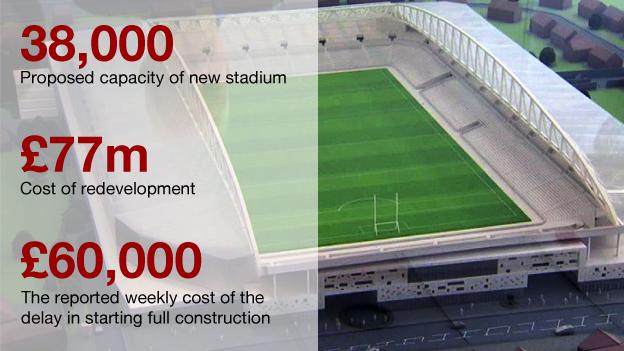
The judge also pointed to the minister never being told of police concerns about safety issues around having 38,000 people attending an event.
While he did not rule on whether the failure to inform Mr Durkan of these concerns was deliberate or accidental, he concluded that it had denied him the opportunity to consider all relevant evidence.
However, he did not quash the minister's decision.
Instead, lawyers for the DoE, the GAA and a residents group who mounted the legal challenge are to make further submissions on appropriate remedies.
Mr Durkan said he remained hopeful that "there might be a positive outcome to this".
'Disappointing day'
Asked for his reaction to the judge's statement that his decision-making had been "fundamentally flawed", Mr Durkan said: "I made what I said at the time was the right decision. I still stand by the decision I made on sound planning grounds. However, the judge has decided that is not the case."
He added: "I'm hopeful that when parties reconvene on Wednesday that common sense will prevail. This is a disappointing day, not just for me and my department, but also for the GAA."

What happens next? The key questions
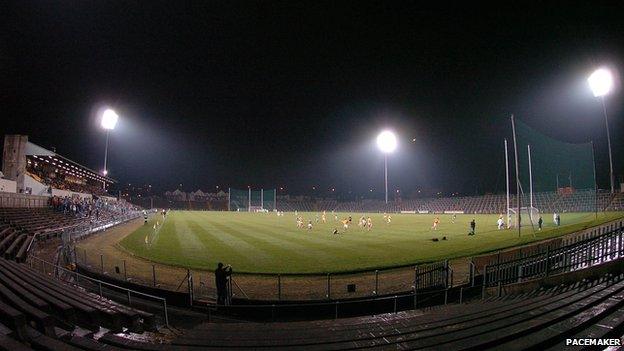
What happens to the £61m of government funding promised for the project? The Planning Service previously indicated that if the funds were not spent in time, a clause in the contract would prevent them becoming available again. During the hearing, the court was told that the money would be returned to the Stormont Executive for spending elsewhere. However, Sports Minister Carál Ní Chuilín said after Monday's judgement that she hoped that money would remain available
What is the possible economic impact? In the short term, construction and planning jobs are at risk in addition to the economic spin-offs that the project would have generated
What effect will this have on Antrim GAA? The county is now left without its main ground, with work to dismantle the existing old stadium having already been completed
What about the 2023 Rugby World Cup bid? The new stadium was set to be one of the GAA venues to be used as one of the Ireland's bid for the 2023 Rugby World Cup. Hugo McNeill, the chairman of the bid, last month said that the Casement Park upgrade was "crucial" to the Northern Ireland component of its proposal

Tom Daly, chairman of the Casement Park Project Board, said they were "deeply disappointed" by the decision.
"The proposed redevelopment of Casement Park would have provided the opportunity of a world class provincial stadium for the GAA and the broader community in the heart of Belfast," he said.
"The project would also have provided much needed economic and social benefits to west Belfast and beyond, including financial investment, new jobs, apprenticeships and community projects.
"Over the coming weeks we will reflect on this decision and consider what the next steps are for Casement Park."
The GAA's provincial body, the Ulster Council, said a 38,000 capacity was needed for the staging of Ulster Senior football finals and All-Ireland quarter-finals.
Mr Daly ruled out a "compromise" 25,000-seater stadium.
He was asked if the Casement project was dead in light of the court ruling, but said it was too early to make any decisions.

West Belfast MP Paul Maskey said the opportunity for the multi-million pound redevelopment of Casement Park must not be lost and urged all parties involved to ensure a resolution is found.
The Sinn Féin representative said: "Jobs and the spin-off from the new stadium would be a huge boost to the local economy."
Since the hearing began, a redeveloped Casement Park has emerged as a potential venue in Ireland's bid to host the 2023 Rugby World Cup.
The redevelopment of Casement Park is part of the government's policy to upgrade the three major sports grounds in Belfast - football's Windsor Park, Ulster's rugby ground at Ravenhill and the Gaelic games stadium at Casement.
Three new stands have been constructed at Ravenhill.
Work on modernising Windsor Park, the home of Irish League club Linfield and the Northern Ireland international team, is ongoing.
- Attribution
- Published5 December 2014
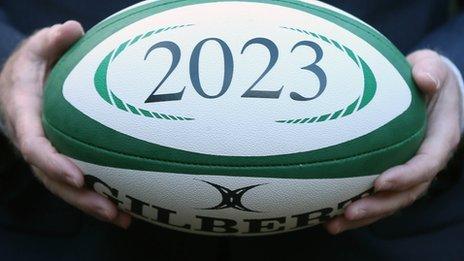
- Attribution
- Published18 August 2012
